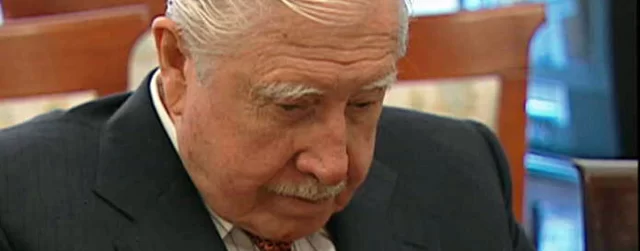Monday Movie: The Pinochet Case, by Dayne Linford

Every Monday, we’ll highlight a piece of writing from our vaults. This review of The Pinochet Case originally ran as a home video review.
Living in America, it’s often easy to think of large portions of the world simply as collections of poverty and human rights abuses. There’s a tendency to write off whole continents, like Africa and South America, as places best not thought about in our busy days. This small but deliberate ignorance has resulted in a general policy in the U.S. and countries like it to simply allow atrocity to continue with little notice, let alone intervention. It’s become expected that smaller countries in economically difficult parts of the world will spiral into a cycle of horrific violence and destruction, and that such a thing is both impossible and immoral to stop, a general codification of NIMBY, allowing it both moral and natural weight.
In the light of this, thank God for films like Patricio Guzmán’s The Pinochet Case, a quiet but searing indictment of the perpetrators of state violence and those who allow it to happen, an emotionally powerful but joyous celebration of those who fought and fight against such violence. The Pinochet Case is nominally about the crimes of Augusto Pinochet, dictator of Chile from 1973 to 1990, and the case brought against him for human rights violations by the international justice system. The film, however, uses this incredible story to address much deeper things – the weight of the memory of horror, and the responsibility of humanity, from Chileans, to Spaniards, to Englishmen, to address and condemn it.
Much time is spent on the political maneuvering among the Chilean, Spanish and British governments to either protect or prosecute Pinochet, but Guzmán knows those events are only the surface of the story, the final results of much greater sacrifices, suffering and work on the part of many Chileans to seek justice for the violations committed in Chile. He focuses on the survivors of Pinochet’s violence as the narrators of this story, the men and women, mostly the latter, who have come forth to expose the truly horrible degradation they were subjected to under Pinochet’s government. Guzmán alternates between interviews with these survivors and interviews with the prosecutors who were working internationally against Pinochet and news reports of the attempt to circumvent the Chilean government and force through both the Spanish and British bureaucracy an order to arrest and bring Pinochet to trial for human rights violations. Structuring the film in this way grounds it considerably, constantly keeping the audience aware of the horror committed by and under this man, driving the imperative to see him finally brought to trial.
This tactic also serves to carry out the final stroke of the film – Guzmán never lets his audience escape from self-reflection and possibly, hopefully, self-censure. By juxtaposing the suffering of women beaten, raped, and degraded against the very fact that it actually took politicking to see Pinochet arrested, Guzmán suddenly turns the focus of the film from the suffering endured by Chile to the willingness of the rest of the world to let it continue for literally decades. We watch Margaret Thatcher meet with Pinochet, thanking him for bringing democracy to Chile, and then hear a woman describe being forced to watch as another prisoner, a large Swedish man, was beaten to death with chains over many hours. We watch a very wealthy English businessman attempt a defense of Pinochet and recall pleasant memories of dinner and discussion with the dictator, and then hear another woman describe how she, because of her position of importance in political resistance and the fact of her gender, was tortured daily, for years, relating in detail the methods used and showing the now abandoned buildings where it happened. Guzmán is not letting anyone off easy.
Like the case it’s named after, The Pinochet Case is ultimately an argument against the allowance of state violence because of convenience and deliberate ignorance, backed up by ever mounting evidence in the form of bodies, testimonials, prisons, weapons, graves and documents. This film is a literal case against those who have perpetrated this violence and those who have looked the other way, a condemnation of the system that almost allowed a monster like Pinochet to retire completely unmolested. But, in the form of the actions of men like Carlos Castressana, the prosecutor who filed the charges, and Judge Baltasar Garzón, who upheld them, The Pinochet Case offers hope. This kind of atrocity does not have to continue unperturbed. Guzmán shows clearly that it is both possible to stop it and moral to stop it. Not content with saying it is morally appropriate to stop it, he shows that it is actually a moral imperative to stop such horror. The Pinochet Case is a film that must be watched and demands to be watched, a bold and powerful rumination on the legal limits of morality, and how those limits can and must be superseded, for the sake of our common humanity.































Allowing dictators to retire unmolested strikes me as much better than having to fight them to the death, as is currently happening in Syria.